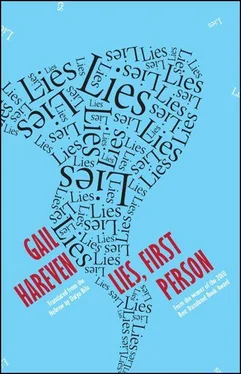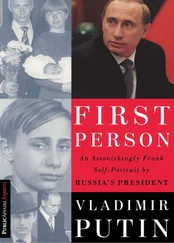A late entry, on the other hand, can lead to the turning of heads, and even though I assumed that he would not be able to recognize me, this logical assumption did not put my mind at rest.
We wanted to get there just in time for the opening of the proceedings, the gods of parking were on our side — bless them — and so we succeeded in entering the hall on time after sitting in the car for less than ten minutes.
I mentioned “the audience” before. The big hall of the Cinematheque was about three-quarters full, which means about three hundred people. Three hundred people had assembled to view “popular portraits of evil.” The tickets cost thirty shekels, Oded and I paid sixty together, and took our places at the back of the hall, close to the exit. Two lecturers spoke before the First Person took the stage, and if we count the host of the panel as well, then he was preceded by three speakers.
What they spoke about — I don’t remember. I started to pay attention only when the host approached the podium for the third time and introduced Hitler, First Person . Until then my eyes were busy searching the front rows for him. My ears were increasingly deafened by the drumming inside them. My nose was dry from sniffing.
As the host reached the podium for the third, time Oded bent down to his bag at my left, took out a yellow legal pad and placed it on his lap, as if about to take notes.
Oded set a pen to the paper, and my eyes no longer searched for Not-man. He rose from his seat in the audience only after the host said: “many publications,” “a range of subjects,” and “a book that gave rise to mixed reactions and a controversy which will no doubt be of interest to us all.”
Hitler, First Person rose, and now there is presumably no option but to raise him up in person.
Evil needs flesh to be incarnated, and who will believe me unless I portray him in the flesh?
The bottom of the portrait shows spider legs so long as to be out of proportion to the rest of the body, the top a coif of wavy hair unaffected by the passage of the years, no doubt further proof of his satanic nature. Before he began to speak he took a pair of narrow reading glasses out of his jacket pocket and set them low on his nose. . and that’s enough. Never mind what the rest of him looked like. He was there, standing on the stage below us, he was there and nothing had changed.
It was evident that most of the audience had no idea of what to expect. A generation had passed since that book first came out, and it never came out in Hebrew at all. People’s memories are short, and in any case they don’t want to remember and they don’t want to know.
Even before he opened his mouth he began to draw attention to himself, sucking it in and gobbling it up: seducing the audience to look at him as he unfolded the arms of his reading glasses, riveting their gaze as he produced a page and smoothed it out slowly on the lectern.
Evil is deceptive, and I was not surprised by the failure of the spectators to recognize it in its present incarnation. And in view of their failure, it occurred to me that I should put an end to him in public, because only thus would a great cry go up — instead of this gullible silence in which they watched him smoothing out his sheet of paper on the lectern.
But I wouldn’t end it in a minute. First he would scream, and shouts would rise from the audience, and at some point I would ask the screaming mouth if he agreed with Schopenhauer and others that pain was more real than pleasure.
We were there. Not-man was close at hand. The possibility was at hand, and until he started to speak I imagined a great shout deafening a different scream, and after that silence. A sentence would wipe out a sentence, as if it had never been pronounced.
When he opened his mouth it spoke English. Then I thought again that it amused him to hide the fact that he knew Hebrew well and understood what people around him were saying. Now I think that perhaps he chose English in order to benefit from the politeness with which strangers and guests are treated.
The mouth opened and shut and opened again. Shall I allow it to make itself heard?
I heard it all, I took in everything from beginning to end, there was never a more attentive listener than me, and even if by doing so I will serve as his mouthpiece, I think that the story obliges me to give an account of his words.
First of all he thanked the moderator for introducing him and the conference hosts for inviting him, and he didn’t simply thank them but tugged his humble forelock, bowed his head, touched his long vulture’s neck, and cooed as modestly as a dove. The imposter thanked, and then he explained that he was going to talk about a grave mistake that he had made, and for a variety of reasons it was important for him to come and admit his painful error here in Jerusalem.
In order to clarify the personal and intellectual background to his fall from grace — he said — he should first explain what he had sought to do in his writing, and what was the nature of the trap into which he had fallen. In his humble opinion, the temptation in question was almost as old as the human race itself.
He had always believed — many people here would no doubt agree with him — that the preeminence of man could be described in one simple and wonderful word: “Why?” A whipped horse does not ask “Why?” A dog — a doubtlessly intelligent animal — when it is kicked will only try to escape from the next kick. A human being expresses his humanity when in confronting the greatest of horrors he insists on demanding “Why?” When Faust seeks to know what holds the world together he does not expect a reply from the field of quantum mechanics or string theory. Faust seeks meaning. He wants to understand.
A human being expresses his humanity in insisting on his need for an explanation.
I could describe how the audience hung on his every word, and say that what I did later on that evening was aimed at liberating all those gullible souls who were seduced and led astray. But the truth is a little different, and the truth is that the more he progressed in his lecture, the less spellbound the audience as a whole became, and I could sense their attention gradually wandering. There were some who leaned forward to catch every word. But there were also not a few who dropped by the wayside: they didn’t understand his English, they had come to see one of the films that were going to be shown later on in the evening. They were impatient to see Magda Goebbels poisoning her children in the bunker, and they had no patience for philosophizing.
Are there some things for which we should not seek an explanation? the mouth asked. Is it wrong to seek an explanation for Hitler? Was this the fateful error he had made? Some see Hitler as a demon, a monster — not in the metaphorical sense, but literally. There are those who see him as a phenomenon originating in the world of darkness, whose meaning or explanation, if they exist, should be sought in the fields of mysticism and theology.
“While I respect this approach, I don’t agree with it,” said the First Person. “Hitler was a human being. He belonged to the human species and, therefore, in principle at least, he can be understood by other human beings. I am not referring, God forbid, to the vulgar notion that claims that ‘there’s a little Hitler inside every one of us,’” the rich voice dried with scorn as it drew out the syllables of a “lit-tile Hit-ler.” Even if it had been incarnated in a different body I would have recognized that mocking voice, pouring scorn on those who don’t understand and all the “downstairs people.”
“Mother Theresa is not Hitler,” he said. “And to say that there is a ‘little Hitler’ inside her, too, is meaningless. But even Mother Theresa, even Janusz Korczak are capable, in principle at least, of understanding who Hitler was. Because no human being is an angel, the boot that tramples and crushes is not beyond the horizons of the understanding of any one of us. Moreover, it is tremendously important for us as human beings to understand what motivates the boot and what lifts the foot to trample a human face.”
Читать дальше












